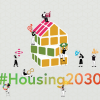Housing and Land Management Press Releases
Displaying Results 26 - 50 of 110
The war has already caused the destruction of infrastructure in many urban areas of Ukraine and will require enormous efforts by the government and international partners to reconstruct following the cessation of hostilities.
In April 2022, the Ministry for Communities and Territories Development
UNECE and the Union of European Football Associations (UEFA) have signed a Memorandum of Understanding with the aim of showing how football and hosting UEFA events can support cities to become more sustainable.
To celebrate the agreement, a side event entitled ‘Football as accelerator of change’
To support Bishkek in moving towards more sustainable, inclusive and resilient urban growth, the UNECE is advancing several smart sustainable city projects in partnership with the capital of Kyrgyzstan.
Bishkek faces multiple challenges, ranging from rapid population growth, continued expansion of
From the climate crisis to inequalities, urban areas play an increasingly central role in tackling key sustainable development challenges. Strengthening the connections between city-level actors and facilitating their engagement in international policy debates is therefore vital to scale up
The world’s urban areas are responsible for the vast majority of CO2 emissions. But cities, led by Mayors, are pushing forward the climate action that will be vital to keep the 1.5°C target alive, adapting to climate change impacts, and making their voices heard alongside national governments at
Increasingly frequent and intense extreme weather events due to climate change that can lead to industrial accidents and unchecked urban and regional development could together be a recipe for disaster, warn the UN and the governments of Albania, Bosnia and Herzegovina, Montenegro, North Macedonia
Cities’ growing role in the implementation of the 2030 Agenda has led to increased global attention on localizing SDGs. The preparation of Voluntary Local Reviews (VLRs) enables the review of SDG implementation at a local level. VLRs complement Voluntary National Reviews developed at the country
Humanity is facing not one but three intertwined crises: the COVID-19 pandemic, climate change, and a lack of adequate and affordable housing. Each of these three emergencies has the potential to compound the multidimensional impacts of the others in health, social cohesion, environmental integrity
Approximately 50 million people in the UNECE region live in inadequate housing conditions. In the 21st century, the governance, land and finance systems that influence the delivery and consumption of housing have been beset by numerous crises. Emanating from climate change, unguided investment
Globally, 690 million people suffer from hunger and three billion cannot afford healthy, nutritious food. Despite this, the Food and Agriculture Organization of the United Nations (FAO) estimates that one-third of all food fit for consumption is either lost during the production or shipping process
The COVID-19 pandemic has had a multi-dimensional effect on the UNECE region, causing the worst economic contraction in decades. Cities and urban areas, with their high population density and interconnectivity, were particularly vulnerable and encountered major disruptions. The pandemic impacted
Approximately 150 million people are homeless and more than 1.8 billion people worldwide lack adequate and affordable housing. While levels of homelessness vary considerably across UNECE countries, finding sustainable solutions to ensure access to housing for all members of society remains a
The United Nations Economic Commission for Europe (UNECE) and the Norman Foster Foundation signed a Memorandum of Understanding (MoU) on 23 March 2021.
The two organisations formalise their cooperation in the promotion of sustainable housing and sustainable cities through the establishment of the
A UNECE-led partnership will improve energy efficiency of the global building supply chain and its products to deliver high performance buildings in seven UNECE member States: Armenia, Georgia, Kyrgyzstan, Republic of Moldova, Tajikistan, Ukraine, and Uzbekistan.
The launch of the project was
More robust monitoring and measuring systems are required to meet the Sustainable Development Goals (SDGs), according to a UNECE report on Measuring and Monitoring progress towards SDGs that uses a “nexus” approach to chart a course for more “joined up” activities.
High-quality statistics are
Localizing the Sustainable Development Goals at the urban level is crucial to deliver on the 2030 Agenda, stresses UNECE in a new report that advocates for a “cities-based” and “people-smart” approach to sustainable development.
With cities today as the driving force in economic, social, and
UNECE calls for integrated and sustainable natural resource use through a "nexus" approach
The use of material resources, fuelled by economic and population growth, urbanisation and societal changes, has increased more than ten times since 1900 and is set to double again by 2030. The annual global extraction of materials has increased from 27 to 92 billion tonnes since 1970, while the
Cities are growing fast. Half the world’s population already lives in urban areas and another 2.5 billion are expected to be living in cities by 2050. In 2015, the international community set the goal of making cities “inclusive, safe, resilient and sustainable” by 2030 (Sustainable Development
UNECE and LIUC – Cattaneo University have agreed to establish a Geneva UN Charter Centre of Excellence to advance sustainable finance for infrastructure and smart cities. Against the backdrop of the COVID-19 pandemic, UNECE joins forces with an expert institution in sustainable finance to support
The new repository will help address disaster risks in line with the 2030 Agenda for Sustainable Development
It consolidates good practices and lessons learned over the past decade in Europe and beyond in the fields of land-use planning and industrial safety
The current health crisis made the need for more robust cities more evident than ever before. The pandemic amplified and exposed the vulnerabilities of current urban realities, including overcrowded public transport, inadequate and unsanitary settlements, high levels of air pollution, and the
Local authorities are on the front line in addressing some of today’s most pressing sustainability challenges, including climate change, environmental degradation, social inclusion and mobility. However, despite their responsibility for actions affecting citizens’ lives every single day, making
The global financial crisis of 2008 was the result of inadequate regulation of financial and real estate markets. Real estate bubbles were allowed to inflate, mortgage lending was inadequately supervised, the financial markets were allowed to develop complex financial instruments that few
UNECE and the Norwegian City of Trondheim have agreed to establish a Geneva UN Charter Centre of Excellence to advance sustainable housing as a foundation for urban development. This is the fifth Centre to be created by UNECE.The Geneva UN Charter on Sustainable Housing endorsed by UNECE supports
Belarus has made considerable progress in implementing sustainable housing and land management policies over the last decade, but targeted efforts will be required to address remaining challenges, according to a new UNECE report.The Second UNECE Country Profile on Housing and Land Management for





















